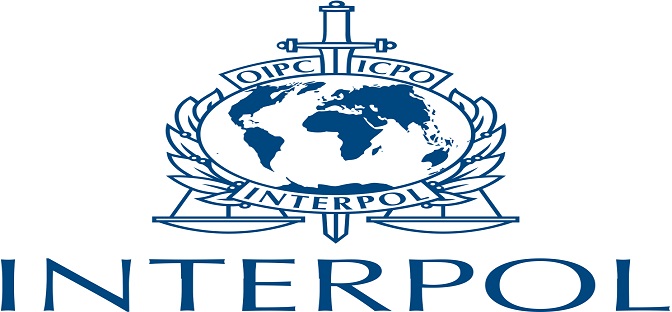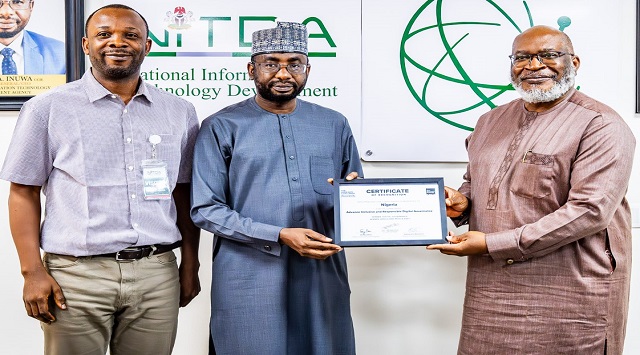News
Interpol Raises Alarm, Says Hundreds of Dollars Leave Nigeria Every Hour

The International Police Organisation’s investigation has shown that every hour, hundreds of thousands of dollars are being laundered out of Nigeria across the world.

This disclosure was made in Abuja on Monday by Garba Umar, Interpol vice president for Africa, while declaring open a four-day training workshop for Nigerian law enforcement agencies at the Economic and Financial Crimes Commission (EFCC) Academy, Abuja.
According to Umar, money laundering across Africa and the entire world has assumed a monstrous dimension and Interpol has designed Silver Notices to combat the menace.
“Evidence has shown that every hour, hundreds of thousands of dollars are flowing out of Nigeria to the region and across the world, laundered before it reaches the pockets of criminals to enjoy the profits of their crimes, while the hardworking and honest Nigerians pay the price of crime”
“With every successful laundering of criminal money, our country becomes more prone to crime. More drugs, more fraud, more corruption and more violence. Every time criminal money is successfully laundered, our financial institutions take an additional blow,” he said.
He stressed that hard times awaited money launderers as the Silver Notices would make illicit funds more difficult to launder in any part of the world.
Speaking on the theme of the Workshop: Strengthening Capacity and Coordination against Financial Crimes, Umar pointed out that financial crimes had become transnational and law enforcement agencies needed regular training for their workforce to be ahead of fraudsters
He urged participants at the workshop to make it a duty to discuss and learn about transnational crimes affecting their regions, identify possible solutions through a review of policing capabilities to support the country, and facilitate direct and in-person interaction amongst law enforcement networks across the country.
“In essence, this Workshop will allow us to re-examine the challenges of fighting transnational crimes in the country, reassess our strategies, and reaffirm our determination and unity as a country to provide security to our citizens and by extension the global community,” he said.
Umar charged all participants at the workshop to take collaboration with other law enforcement agencies seriously, to advance their investigations and ensure that criminals do not get to enjoy the fruits of their labour.
“The only way we can move forward as a country is by working together and identifying common problems, jointly devising solutions, and taking coordinated and cohesive action. And now is the time that we need to go far, by going together, he said.
Ola Olukoyede, executive chairman of the EFCC, in his goodwill message, also harped on the need for enhanced collaboration in tackling financial crimes.
He particularly stressed that the complex nature of corruption across the world could only be broken by the might of collaborative actions by every stakeholder. “The daunting nature of the fight against corruption in Nigeria and the world at large deserve serious collaboration among organizations saddled with the responsibility of fighting corruption”, he said.
Olukoyede, who spoke through Francis Usani, director, Fraud Risk Assessment and Control, FRAC, of the EFCC, appraised the pivotal role of the EFCC in tackling corrupt practices, especially its impressive records of convictions and recoveries, and expressed optimism that with the new emphasis on the preventive framework in tackling financial crimes by the commission, greater progress would be made.
“Our records of convictions and recoveries stand us out, but we will not rest on our oars, we are committed to doing more and in this commitment, the EFCC is re-strategising its operations with a focus on prevention knowing that it is easier and cheaper to prevent corruption from happening than investigating and prosecuting corruption,” he said.
In his remark, Kazuyoshi Matsunaga, ambassador extraordinary and plenipotentiary of Japan to Nigeria, described the workshop as an important joint initiative between Japan and Nigeria to combat financial crimes.
He explained that in the contemporary globalised world, financial crimes transcended borders and required international cooperation among law enforcement agencies to combat them.
“I am delighted that INTERPOL and the Japanese National Police Agency are an integral part of this project, contributing their expertise. A remarkable collaboration took place three years ago when Japanese and Nigerian law enforcement agencies successfully returned a fund to a Japanese fraud victim, earning immense gratitude. Strengthening our partnership through this project will benefit not only Nigerians but people around the world, including the Japanese,” he said.
Hafsat Bakare, director general and chief executive officer of the Nigerian Financial Intelligence Unit, NFIU, spoke about the imperative of strengthening capacity and coordination against financial crimes, pointing out that “ financial intelligence and financial analysis techniques are key to tackling economic crimes”.
“The NFIU, she said, was sensitive to the interconnected nature of the criminal justice system, the threat of organised crime, and cybercrimes being fought by law enforcement agencies.
She expressed optimism that the training law enforcement officers would receive at the Workshop would “ sustain efforts being made to ensure that Nigeria exits the Grey List of the Financial Action Task Force possibly by mid-2025.”
Isaac Oginni, director of Interpol Financial Crime and Anti-Corruption Centre (IFCACC), said the only way to disrupt organised crimes was by denying fraudsters the financial profit behind their criminal enterprise. Besides, financial intelligence could also be utilised well when investigators recognise its value and use it to build a financial profile around suspects.
He challenged participants and stakeholders at the workshop to collectively work together and fight money laundering.
“Each agency represents a different shape of the puzzle with our different strengths and mandates. Each piece of the puzzle forms part of the bigger picture, and even one missing piece will prevent the whole picture from being developed,” he said.
“Today, we will commence the first phase of the Interpol/JICA workshop, a capacity-building project that aims to strengthen Nigeria’s safety through enhancing law enforcement’s capacity to combat financial crime, as well as through increased national cross-agency collaboration and cooperation,” he said.
The four-day workshop, the first of its kind and hosted by the EFCC was organised by INTERPOL and the Japan International Cooperation Agency, JICA.
It drew participants from the Police, EFCC, NFIU, Nigeria Immigration Service, and the Nigeria Customs Service.
News
NITDA Partners OGP to Drive Presidential Digital Goals

The Director General of the National Information Technology Development Agency (NITDA), Kashifu Inuwa, CCIE, has reaffirmed Nigeria’s commitment to open governance, transparency and inclusive digital development as the Open Government Partnership (OGP) team formally presented the award and certificate received at the OGP Global Summit Spain 2025 to the Agency’s leadership.

Nigeria emerged as the overall global winner in the Digital Governance category in recognition of the country’s excellence in deploying digital tools and policies to strengthen government transparency, accountability, and citizen engagement. In addition, Nigeria received the Regional Award for advancing Open Digital Governance across Africa and the Middle East, reaffirming its leadership role in promoting open government principles and driving digital transformation across the region.
These recognitions were largely attributed to initiatives led by NITDA in collaboration with civil society partners, such as Dataphyte, which showcased innovative and inclusive approaches to digital governance at the summit.
The summit, which was organised in Vitoria-Gasteiz, Spain, brought together more than 1,500 high-level representatives of governments, civil society leaders, and policymakers from around the world to exchange experiences, best practices, and progress on open government initiatives and implementation on key issues.
Receiving the OGP delegation at NITDA, Inuwa described the recognition as a national honour rather than an institutional one, stressing that the award reflects Nigeria’s collective efforts across government, civil society and the private sector in advancing open governance principles through the digital space.
According to him, such global recognition comes with heightened responsibility to deliver on commitments made under the OGP framework.
“This is not just about NITDA. It is a national recognition, and every recognition comes with responsibility,” the DG said.
“If we fail to execute the commitments we have made, it will not only affect our image locally but also at the international stage. This is also not something NITDA can do in isolation,” he added.
Inuwa linked the achievement directly to the Renewed Hope Agenda of President Bola Ahmed Tinubu, noting that digital transformation, transparency, economic diversification, job creation and efficient public service delivery remain central presidential priority areas.
He emphasised that leveraging digital technologies to deepen openness and accountability aligns with national objectives of strengthening institutions, improving governance outcomes and building trust between government and citizens.
Highlighting the importance of collaboration, the NITDA boss underscored the role of the OGP platform as a catalyst for a strong multi-stakeholder approach in Nigeria’s digital ecosystem.
He called on civil society organisations, development partners, the private sector and other government institutions to provide technical expertise, guidance and sustained engagement to ensure effective implementation of agreed commitments.
“We need to leverage the OGP platform. We need your expertise, your guidance, your support and your commitment to hand-hold us in delivering on these commitments,” he said.
He further noted that “a multi-stakeholder approach in the digital space is critical to fostering a resilient ecosystem that delivers real value to citizens.”
Inuwa disclosed that NITDA has already begun internal reviews of its OGP commitments and has tasked its representatives, including Dr Rousseau, to work with colleagues to develop a clear execution strategy.
He proposed the creation of joint work streams with OGP stakeholders to support implementation, ensure accountability and keep all parties on track.
“We are humans. Oversight and collaboration help us stay focused. With commitment, nothing is impossible, and I believe these goals are achievable,” he added, assuring the delegation of NITDA’s readiness and political will to deliver on all agreed commitments.
Inuwa also welcomed the idea of engaging the political leadership of OGP, including the Honourable Minister of Budget and Economic Planning, with a view to briefing President Tinubu on the achievement. He noted that celebrating milestones is important, as it reinforces morale and demonstrates that Nigeria’s efforts in digital governance are gaining global recognition.
“It’s also good when there are wins, we should celebrate, because we too never knew that the little things we are doing are noticed not just within Nigeria, but globally, to the extent of earning us this award,” he asserted.
He concluded by expressing gratitude to the Nigerian National OGP Secretariat and the global OGP leadership, reaffirming NITDA’s commitment to strengthening collaboration and building a more productive working relationship that will translate open governance principles into measurable national impact.
Earlier in his remark, Mr Olusoji Apampa, who led the OGP deelegation, said the honours were earned through a strong partnership between government and civil society, with NITDA playing a critical role, particularly in commitments focused on improving digital governance in Nigeria.
Apampa expressed hope that the awards would serve as added momentum to deepen ongoing commitments under NITDA’s leadership and accelerate the practical implementation of reforms aimed at strengthening digital governance across the country.
News
PalmPay Launches N400 Million World Travel Carnival, Rewarding Users with Free Global Trips

PalmPay, Nigeria’s leading digital banking platform, has announced the launch of its ₦400 million festive rewards campaign, designed to reward users with cash prizes and fully sponsored international travel experiences for everyday transactions on the PalmPay app.

The campaign will run from December 17, 2025, to January 8, 2026. The campaign is designed to reward everyday transactions with extraordinary experiences. It runs alongside PalmPay’s Purple December brand campaign, which focuses on wrapping up the company’s key brand and community initiatives for the year.
At the centre of the rewards campaign is the PalmPay World Travel Carnival, an interactive card collection experience that allows users to earn city cards by completing transactions on the app. Users are required to collect five city cards – London, New York, Dubai, Sydney, and Cape Town and combine them into a World Card, which unlocks a share of the prize pool.
The more World Cards a user creates, the larger their share of the cash rewards. Any extra uncombined cards can be swapped with friends and other PalmPay users to help complete additional World Cards.
Beyond cash rewards, the Carnival also offers Free Global Trips. In each round, the top two users with the highest number of eligible transactions (₦100 and above) and at least one World Card will win an all-expense-paid international trip.
The travel grand prize covers:
- Visa fees
- Round-trip international airfare
- 5-day, 4-night hotel accommodation
- Side attraction
- Meal expenses
- Airport pick-up and drop-off
- All transportation for scheduled tour activities during the trip
Winners will be determined through a transparent leaderboard system, with prizes credited automatically at the end of each round on December 25, December 31, and January 8.
Participation is simple:
- Complete tasks on the PalmPay app, such as Airtime, Data, Transfers, and other specific transactions listed in the app, to earn cards.
- Collect all five city cards.
- Swap cards with friends to complete your collection.
- Combine cards to form a World Card and earn cash rewards.
- Perform more transactions to climb the leaderboard for a chance at the global trip prize.
To ensure fairness, PalmPay has instituted strict rules: no cheating, bots, fake accounts, or manipulation. Any violations may lead to disqualification or account bans. Additionally, the Free Travel Prize is limited to one per user throughout the campaign.
Speaking on the launch, Femi Hanson, Head of Marketing & Communication, “This festive rewards campaign is about turning everyday banking into meaningful value for our users. With the World Travel Carnival as the headline activation, we are reinforcing PalmPay’s promise of being the smarter way to bank—where smart financial decisions unlock bigger opportunities.”
News
REA, NBS Partner to Deliver Comprehensive Energy Data for Nigeria

The Rural Electrification Agency (REA) and the National Bureau of Statistics (NBS) have signed a Memorandum of Understanding (MoU) to conduct a nationwide energy survey aimed at closing long-standing data gaps in Nigeria’s power sector. The initiative is expected to guide policy, attract investment, and accelerate universal electricity access.

Signed in Abuja, the agreement establishes a National Energy Survey based on the Multi-Tier Tracking Framework (MTF), a globally recognized methodology that measures electricity access not only by grid connection but also by quality, affordability, reliability, and usage of electricity and clean cooking solutions.
The survey will be implemented under the Energy Sector Management Assistance Program (ESMAP) of the World Bank. Dr. Abba Aliyu, REA Managing Director/CEO, said the partnership underscores REA’s commitment to evidence-based rural electrification planning and will generate detailed insights on electricity access and off-grid solutions nationwide.
Prince Adeyemi Adeniran, Statistician-General of the Federation/CEO of NBS, emphasized that reliable statistics are essential for effective policymaking, assuring that NBS will provide technical oversight, sampling expertise, and quality assurance to meet global standards.
The survey will assess energy access, household affordability, expenditure patterns, and the adoption of off-grid technologies such as solar home systems, mini-grids, and clean cooking solutions. REA will provide sector expertise and policy alignment, while NBS manages regulatory approvals, methodology, and technical supervision.
Funded and technically overseen by the World Bank, the exercise will run for 18 months, with the resulting data expected to improve national energy planning, programme targeting, and private sector investment, particularly in underserved and rural communities.
Officials said the collaboration reflects the Federal Government’s commitment to strengthening inter-agency coordination, enhancing energy data availability, and advancing Nigeria’s goal of universal electricity and clean cooking access.

 General News2 days ago
General News2 days agoFirstCap Acts as Joint Issuing House on Veritasi Homes & Properties Plc’s ₦30 Billion Bond Programme

 News2 days ago
News2 days agoPalmPay Launches N400 Million World Travel Carnival, Rewarding Users with Free Global Trips

 E-Business2 days ago
E-Business2 days agoNigeria Takes the Lead in the Global WSIS+20 Digital Agenda

 Telecom2 days ago
Telecom2 days agoQualcomm Completes Third Edition of Make in Africa Startup Mentorship Program

 Telecom2 days ago
Telecom2 days agoMastercard Expands Africa Acceptance Network by 45% in 2025, Driving Digital Economy Growth

 E-Business3 days ago
E-Business3 days agoUBA Partners CIG Motors, Lagride, Launches $100m “Drive to Own” Scheme

 Telecom2 days ago
Telecom2 days agoFynd Expands Global Footprint, Adds Africa With Surtee Group Partnership

 Telecom2 days ago
Telecom2 days agoAI Meets Governance: Anambra Rolls Out SmartGov for Seamless Citizen Interaction



























